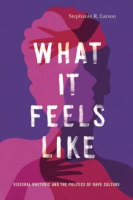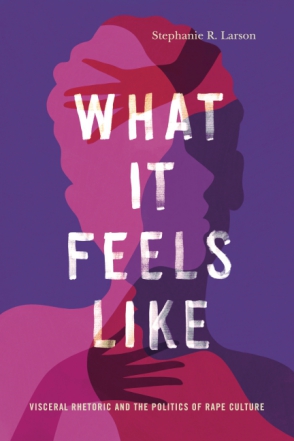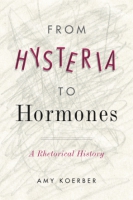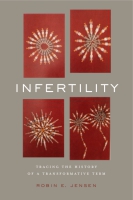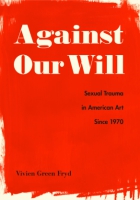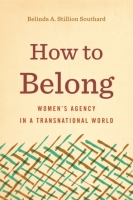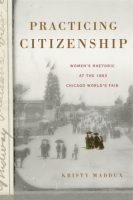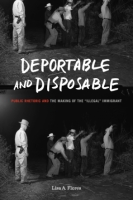What It Feels Like
Visceral Rhetoric and the Politics of Rape Culture
Stephanie R. Larson
Winner of the 2022 Association for the Rhetoric of Science, Technology, and Medicine (ARSTM) Book AwardWinner of the 2022 Winifred Bryan Horner Outstanding Book Award from the Coalition of Feminist Scholars in the History of Rhetoric and Composition
Honorable Mention, 2023 Book Award from the Rhetoric Society of America
“What It Feels Like is an exciting contribution to rhetorical studies and women’s and gender studies, offering a theory of visceral rhetoric that provides both explanatory power for rape culture and a potential framework for feminist intervention. It addresses a timely topic in a refreshingly new way, providing critical insight into how rape culture is rhetorically constituted as well as reason to hope for change.”
- Description
- Reviews
- Bio
- Table of Contents
- Sample Chapters
- Subjects
Investigating anti-pornography debates from the 1980s, Violence Against Women Act advocacy materials, sexual assault forensic kits, public performances, and the #MeToo movement, Larson reveals how our language privileges male perspectives and, more deeply, how it is shaped by systems of power—patriarchy, white supremacy, ableism, and heteronormativity. Interrogating how these systems work to propagate masculine commitments to “science” and “hard evidence,” Larson finds that US culture holds a general mistrust of testimony by women, stereotyping it as “emotional.” But she also gives us hope for change, arguing that testimonies grounded in the bodily, material expression of violation are necessary for giving voice to victims of sexual violence and presenting, accurately, the scale of these crimes. Larson makes a case for visceral rhetorics, theorizing them as powerful forms of communication and persuasion.
Demonstrating the communicative power of bodily feeling, Larson challenges the long-held commitment to detached, distant, rationalized discourses of sexual harassment and rape. Timely and poignant, the book offers a much-needed corrective to our legal and political discourses.
“What It Feels Like is an exciting contribution to rhetorical studies and women’s and gender studies, offering a theory of visceral rhetoric that provides both explanatory power for rape culture and a potential framework for feminist intervention. It addresses a timely topic in a refreshingly new way, providing critical insight into how rape culture is rhetorically constituted as well as reason to hope for change.”
“Not only does Larson’s work provide various avenues for researchers to continue conversations about sexual violence, but it also supplies instructions for increasing the efficacy of anti-rape advocacy. Ultimately, Larson makes a convincing case that scholars and activists alike would do well to talk about bodies and acknowledge the rhetorical power of viscerality.”
Stephanie R. Larson is Assistant Professor of Rhetoric at Carnegie Mellon University.
Preface: The Problem with Origin Stories
Acknowledgements
Introduction: Bodies, Feelings, and the Rhetoric of Rape Culture
1. Sensing the Nation at Risk: Sexual Citizenship and the Meese Commission
2. The Specter of Patriarchy: Imagining Victims in Bystander Discourse
3. The Proof Is in the Body: Transcending Rhetoric with Rape Kits
4. Disrupting Silence: The Law and Visceral Counterpublicity
5. Taking It All In: #MeToo, Feminist Megethos, and List Making
Conclusion: “I Was Trapped in My Body”: Writing and Living
After Rape
Notes
Bibliography
Index
Download a PDF sample chapter here: Introduction
Also of Interest
Mailing List
Subscribe to our mailing list and be notified about new titles, journals and catalogs.
